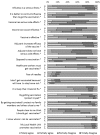Beliefs and Opinions of Health Care Workers and Students Regarding Influenza and Influenza Vaccination in Tuscany, Central Italy
- PMID: 26344950
- PMCID: PMC4494245
- DOI: 10.3390/vaccines3010137
Beliefs and Opinions of Health Care Workers and Students Regarding Influenza and Influenza Vaccination in Tuscany, Central Italy
Abstract
Immunization of health care workers (HCWs) against influenza has been associated with improvements in patient safety. The aim of this study is to assess the beliefs, attitudes, and knowledge of HCWs and health profession students regarding influenza. An anonymous questionnaire was distributed to HCWs in three local Florentine healthcare units, at Careggi University Teaching Hospital, and to students in health profession degree programs. A total of 2576 questionnaires were fully completed. A total of 12.3% of subjects responded that they were "always vaccinated" in all three of the seasonal vaccination campaigns studied (2007-2008 to 2009-2010), 13.1% had been vaccinated once or twice, and 74.6% had not received vaccinations. Although the enrolled subjects tended to respond that they were "never vaccinated," they considered influenza to be a serious illness and believed that the influenza vaccine is effective. The subjects who refused vaccination more frequently believed that the vaccine could cause influenza and that it could have serious side effects. More than 60% of the "always vaccinated" group completely agreed that HCWs should be vaccinated. Self-protection and protecting family members or other people close to the respondent from being infected and representing potential sources of influenza infection can be considered motivating factors for vaccination. The results highlight the importance of improving vaccination rates among all HCWs through multi-component interventions. Knowledge of influenza should be reinforced.
Keywords: attitudes; health care workers; health professions students; influenza; knowledge.
Figures
References
-
- World Health Organization Media Center. Influenza (seasonal). Fact Sheet no 211. Mar, 2014. [(accessed on 20 October 2014)]. Available online: http://www.who.int/mediacentre/factsheets/fs211/en/
-
- CDC Immunization of Health-Care Personnel: Recommendations of the Advisory. Committee on Immunization Practices (ACIP) MMWR Recomm. Rep. 2011;60:1–45. - PubMed
LinkOut - more resources
Full Text Sources
Other Literature Sources


